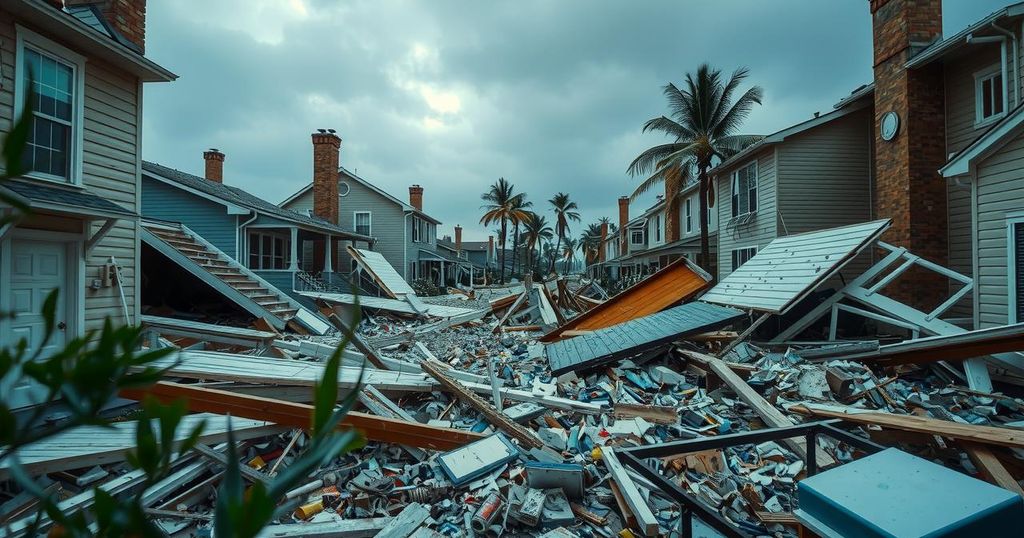Weather
World news
AFRICA, BE, BRIAN MCNOLDY, CARRIACOU, CUBA, DEAN, EVACUATIONS, GULF OF MEXICO, HELENE, HURRICANE, HURRICANE BERYL, HURRICANE SEASON, KATE, MILTON, NATIONAL HURRICANE CENTER, NATURAL DISASTER, NORTH AMERICA, OSCAR, RAFAEL, RITA, SOUTH AFRICA, U. S, UNIVERSITY, UNIVERSITY OF MIAMI, VIRGINIA, WEATHER
Maya Ramirez
0 Comments
2024 Atlantic Hurricane Season Ends with Record-Breaking Activity and Damage
The 2024 Atlantic hurricane season concluded with 11 hurricanes, exceeding the average of seven, and resulting in widespread devastation particularly from Hurricane Helene, which caused significant fatalities and damages. Hurricanes Beryl, Milton, and Rafael were particularly notable, with record-breaking intensity and early formation. Climate change has been identified as a contributing factor to the unusual activity this season.
The 2024 Atlantic hurricane season concluded on Saturday, marking a tumultuous period characterized by unprecedented activity. The season recorded 11 hurricanes, surpassing the average of seven, and inflicted significant destruction across the U.S. Gulf Coast and beyond. Notably, eight hurricanes made landfall in regions including the U.S., Bermuda, Cuba, the Dominican Republic, and Grenada, raising grave concerns over public safety and infrastructure resilience.
One standout event was Hurricane Beryl, which became the earliest recorded Category 4 hurricane in June, impacting Grenada severely, resulting in crop devastation and fatalities. Following suit, it intensified into the earliest Category 5 hurricane ever in the Atlantic by July 1. According to Brian McNoldy, a hurricane researcher at the University of Miami, such early and powerful storms are exceptionally rare. The typical inception date for major hurricanes is September 1, as per the National Hurricane Center’s data.
September saw Hurricane Helene deliver catastrophic impact, being the deadliest storm on the U.S. mainland since Hurricane Katrina in 2005, with over 200 fatalities and significant economic damages exceeding $48.8 billion, predominantly in North Carolina. Florida, Georgia, South Carolina, Tennessee, and Virginia also reported extensive storm-related damages.
As October arrived, Hurricane Milton escalated rapidly, reaching wind speeds of 180 mph, marking it among the strongest hurricanes ever recorded in the Gulf of Mexico, following only Hurricane Rita of 2005. Meteorological data indicated that regions affected by Helene and Milton experienced rainfall levels three times higher than average, leading to record-breaking wet conditions in Asheville, Tampa, and Orlando.
Later in November, Hurricane Rafael reached 120 mph, nearly setting a record for November hurricanes in the Gulf of Mexico and complicating Cuba’s recovery efforts after Hurricane Oscar’s aftermath. The unusual number and intensity of storms this season have raised discussions about the influence of climate change.
According to McNoldy, the rapid warming of oceans due to anthropogenic greenhouse gases is contributing to hurricane intensity and frequency. “In other words, we never had a storm as strong as Beryl so early in the season anywhere in the Atlantic and we never had a storm as strong as Milton so late in the season in the Gulf of Mexico,” he stated, indicating the correlation between warming oceans and hurricane properties.
While attributing extreme weather events directly to climate change is complex, McNoldy emphasized its role in making such severe occurrences more probable.
The Atlantic hurricane season is a yearly occurrence that runs from June 1 to November 30, during which hurricanes form and often impact the coastal regions of the United States and surrounding areas. The 2024 season was marked by higher-than-average hurricane activity, attributed to warmer ocean temperatures, which play a critical role in the formation and intensification of these tropical storms. The season’s events exemplify not only the destructive potential of hurricanes but also raise important discussions about the implications of climate change on weather patterns.
The 2024 Atlantic hurricane season has concluded with an unprecedented number of hurricanes, resulting in significant loss of life and property. The implications of climate change have become increasingly evident, as warmer ocean temperatures have facilitated the formation of early and intense hurricanes. The destructive nature of storms like Beryl, Helene, Milton, and Rafael calls for a deeper understanding of hurricane dynamics and the pressing need for measures to mitigate the effects of climate change on future hurricane seasons.
Original Source: www.wtvr.com




Post Comment